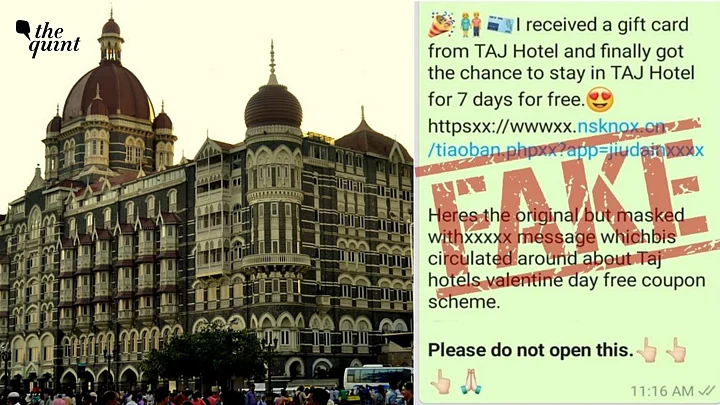The Mumbai Police has warned social media users of a viral message on WhatsApp and other social media, which falsely claims to offer a gift card for a free seven-day stay at Taj Hotel in Mumbai, ahead of the Valentine’s Day.
“Fake promotional messages during Valentines are common, we request you to not click links on such messages,” the Mumbai Police stated in a tweet.
The viral message reads, “I received a gift card from TAJ Hotel and finally got the chance to stay in TAJ Hotel for 7 days for free.” Followed by a link which purportedly allows one to ‘play a game and earn the gift card.’
According to an article on Business Today, once the player has “won” the gift card by selecting a ‘random box,’ the link then directs them to another page asking the player to forward the message to either “five groups or 20 individuals” on WhatsApp.
We Offer No Such Promotion: Taj Hotel
However, the Mumbai-based luxury hotel chain has asserted that “Taj Hotels/IHCL has not offered any such promotion. We request to take note of this and exercise due caution.”
Further, the hotel uses the website, ‘tajhotel.com’ and the Indian Hotels Company Limited, which owns the Taj brand, uses ‘ihcltata.com.’ They do not use the ‘.cn’ domain – which is the country-code for People’s Republic of China – seen in the viral link.
The cyber wing of Maharashtra Police has warned people of potential phishing attacks through unverified offers made during Valentine’s day on social media.
A cyber wing official told PTI, “Such internet links promising freebies aim to capture personal details, which could be used to carry out online frauds.”
How Can You Recognise Hoax Messages?
WhatsApp states that unsolicited messages from an unauthorized third party, often in the form of spam, hoax or phishing attacks, can try to “deceive you and prompt you to act in a certain way.”
Such messages can be recognised by the following characteristics:
- The sender claims to be affiliated with WhatsApp.
- The message includes instructions to forward the message.
- It claims you can avoid punishment, if you forward the message.
- It includes a reward or gift from WhatsApp or others.
It’s advisable to avoid engaging with such messages or clicking on any links associated with them.
(At The Quint, we question everything. Play an active role in shaping our journalism by becoming a member today.)
